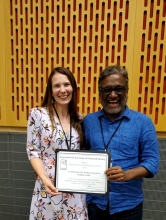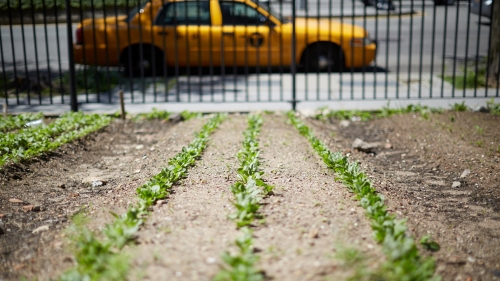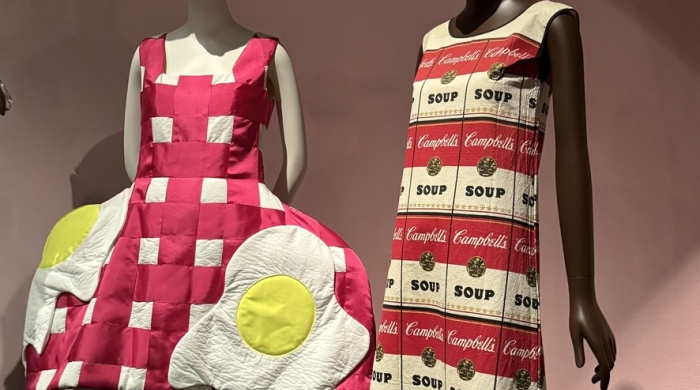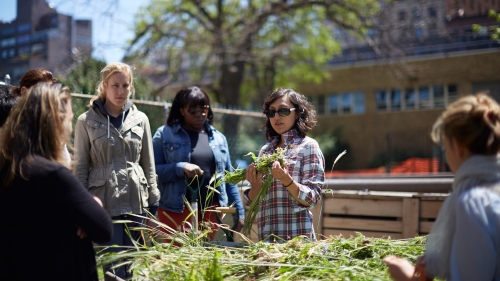The Warren Belasco Prize recognizes “superior research, a unique perspective and methodological approach, and novel insights for the study of food."

Krishnendu Ray and Stephanie Jolly with their certificate for the Warren Belasco Prize.
Krishnendu Ray, professor of food studies and director of the food studies PhD program at NYU Steinhardt, has been awarded the prestigious 2024 Warren Belasco Prize for Scholarly Excellence from the Association for the Study of Food and Society.
Ray and his co-authors, historian Kathleen Burke and travel writer Stephanie Jolly, received the award for their article “Foods in the Indian Ocean World: Mobility, Materiality, and Cultural Exchange,” which appeared in a special issue of Verge: Studies in Global Asia on “Culinary Cultures on the Move.”
The article, which was written and edited over a period of nearly three years and spanning the height of the COVID-19 pandemic, points a multidisciplinary lens at the study of food, trade, and culture in the Indian Ocean – a region that tends to get less attention in the Euro-American-centric world of food studies. The article seeks to rethink and synthesize material on this understudied area, reorienting the discussion to places such as southwest Asia and eastern Africa.
“This also returns us to the effect of nature on Indian Ocean cultures, some of which has been lost due to 19th century attitudes on ecological determinism and its role in the construction of modern racism,” says Ray. “The food and culture of the Indian Ocean is based on things such as where wet-rice grows and where it doesn’t, and which spices are available, all of which connect back to monsoons and the movement of air and water current on ancient trade routes.”
[The Warren Belasco Prize] is a sign that doing this kind of multidisciplinary and multi-generational scholarship is useful as a form of academic and popular knowledge for a wider and more diverse audience.
The article examines the role and history of different comestibles in Indian Ocean culture, such as coffee, tea, the chewing of masticates like betel leaf and betel nut, and spices such as nutmeg and mace.
“We use these examples to explore the question, ‘What could happen to food studies if it learned something from the rich literature and history of the Indian Ocean world?’” says Ray. “And conversely, ‘What might the historians of the Indian Ocean world gain from the multidisciplinary and multi-temporal analytical apertures of food studies?’”
Another revolutionary element of Ray’s article is the combining of areas of expertise – his as a sociologist, Burke’s as a historian completing her PhD on the Dutch East Indies, and Jolly’s as a travel writer outside of academia.
“One of the things food studies tries to do is take detailed esoteric knowledge produced within the academy and present it to an exoteric audience,” says Ray. “This award is a sign that doing this kind of multidisciplinary and multi-generational scholarship is useful as a form of academic and popular knowledge for a wider and more diverse audience.”
Related Articles
Sara B. Franklin Publishes Much Anticipated Biography of Editor Judith Jones
Legendary editor Judith Jones finally gets her due in this intimate biography written by Sara B. Franklin, a professor at the NYU Gallatin School for Individualized Study and an alumni of Steinhardt's Food Studies program.
Nutrition and Food Studies Graduate Sasha Dubose Speaks at Inaugural Queer Food Conference
The 2024 graduate participated in a panel on how food and eating can create community.
Nutrition and Food Studies Research Benefits New York Communities
This is the first in a series of articles highlighting how Nutrition and Food Studies faculty are combining research insights and applied expertise to bring positive change to New York City.
Related Programs
Related Department

Nutrition and Food Studies
411 Lafayette Street, 5th Floor
New York, NY 10003
Phone: 212-998-5580
Email: nutrition@nyu.edu




